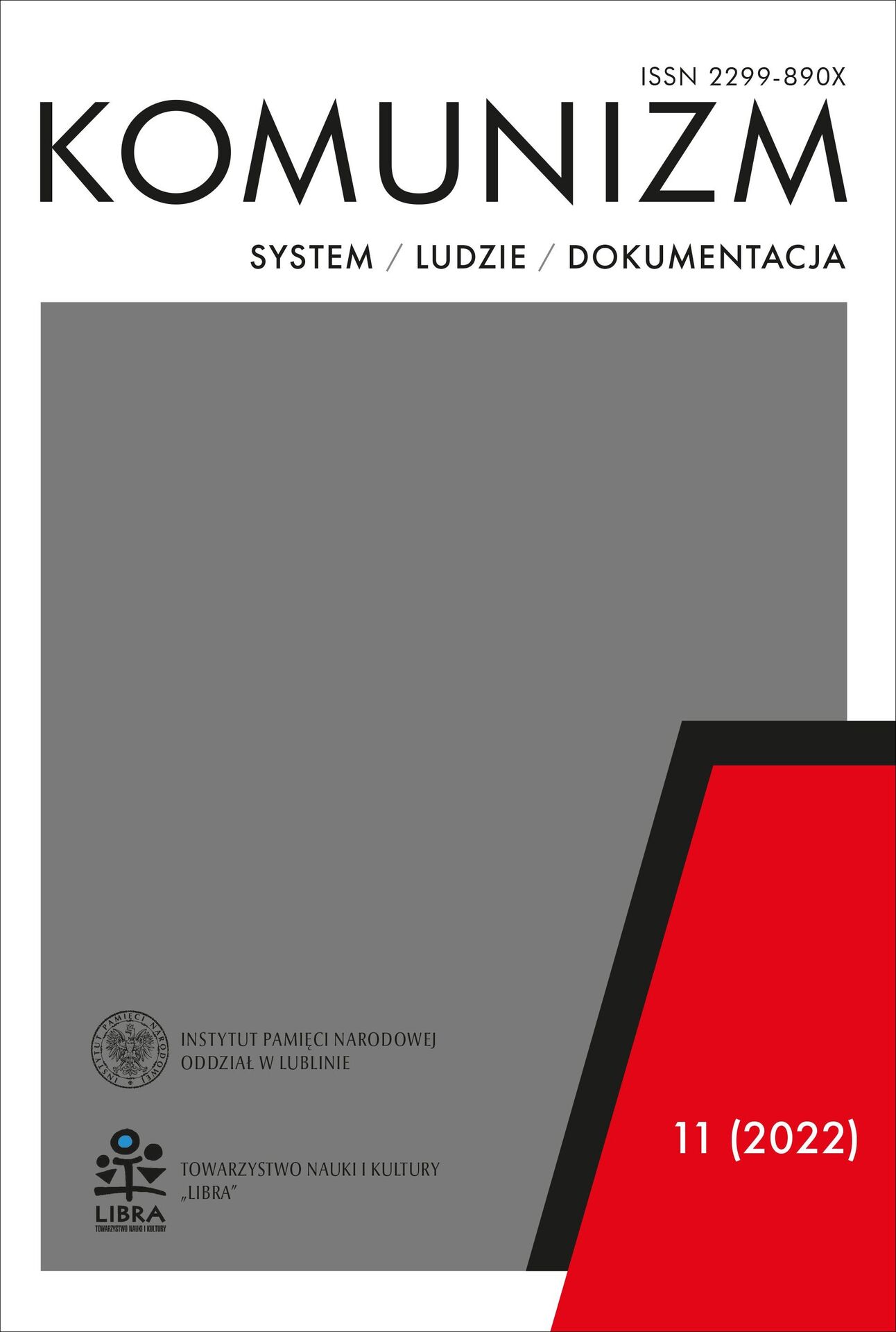Managing the cadres, ideology and production plan. The basic party organisations of the Polish United Workers’ Party at the Jankowice coal mine in Boguszowice and the railway hub in Rybnik in the years 1951–1975 (in the light of documents)
Komunizm: system-ludzie-dokumentacja, No. 11 (2022), pages: 75-145
Publication date: 2023-06-26
 https://doi.org/10.48261/2299.890X.11.2022.04
https://doi.org/10.48261/2299.890X.11.2022.04
Abstract
The PZPR (the Polish United Workers’ Party) – the Marxist-Leninist party claiming to be the vanguard of the working class and in charge of the state on its behalf, was a mass organisation with strong local structures that also existed in the workplace. In large enterprises, such as the railway hub in Rybnik and the Jankowice coal mine in Boguszowice, it was involved in company committees and played a significant political role in the life of the cities where it operated. The Marxist theoreticians emphasised that the most important duty of company units of the PZPR was to take care of the proper shape of interpersonal relations, solve problems in workplaces and in the places of residence and participate in political life of the local area. The two company party organisations in question co-managed political rituals in their locality and workplace, dealt with personnel policy and micro-management (including the organisation of workplace competitions and “production meetings”), duplicated the activities of the industrial administration and supervised employee and trade union bodies that functioned in the workplace. They were also in charge of social and political organisations that operated in their parent establishments. Both of the company committees also had to promote the ideology of the party by organising political training, organisational meetings, open meetings or worker mass meetings, as well as supervise the implementation of party propaganda in their area and encourage employees to meet their production goals and perform their political duty. A specific feature of the company committee at the Jankowice coal mine, the largest workplace in the municipality of Jankowice at the time, was the organisation of the daily life of the residents of the the workers’ housing estate near the mine. The company committees also performed organisational functions, cared for their own growth and the increase in the number of party members among the employees. Their basic responsibility was to follow the orders of the superior authorities – the District Committee of the PZPR in Rybnik in this case. However, the authorities of both these company committees considered their most important work to be action undertaken to increase the production of coal (in the case of the coal mine) and the efficient organisation of the transport of goods, especially coal (in the case of the railway node) – that is, purely economic tasks.
Keywords
komunizm • PZPR • kopalnia • kolej • ideologia • współzawodnictwo pracy communism • the Polish United Workers’ Party (the PZPR) • PZPR • coal mine • railway • ideology • workplace competition
References
Dąbek K., PZPR – retrospektywny portret własny, Warszawa 2006.
Dobosz W., POP w dużych zakładach… [w:] PZPR w działaniu, red. M. Surmaczyński, Warszawa–Wrocław 1975.
Dudek A., Funkcjonowanie systemu nomenklatury kadr PZPR na szczeblu wojewódzkim (1948–1980). Przykład Krakowa [w:] Komunizm. Ideologia, system, ludzie, red. T. Szarota, Warszawa 2001.
Dudek A., Komitet wojewódzki PZPR jako lokalny ośrodek władzy – na przykładzie Krakowa [w:] Centrum władzy w Polsce 1948–1970, red. A. Paczkowski, Warszawa 2003.
Jaros J., Słownik historyczny kopalń węgla kamiennego na ziemiach polskich, Katowice 1984.
Kantyka J., W latach sześćdziesiątych – w klimacie przemian popaździernikowych [w:] Dzieje górniczego ruchu zawodowego w Polsce 1945–1987, t. 3, red. J. Kantyka, Katowice 1990.
Keller D., Kloch B., Soida K., Wieczorek E., Koleją z Katowic do Raciborza. Najciekawsze linie kolejowe Polski, Rybnik 2006.
Krzysztofik R., Konurbacja rybnicka [w:] Encyklopedia województwa śląskiego, t. 1, wyd. internetowe (2014), adres: http://ibrbs.pl/mediawiki/index.php/Konurbacja_rybnicka
Kurz A., Podstawowa Organizacja Partyjna. Jej rola i zadania, Warszawa 1971.
Materniak S., POP w strukturze partii marksistowsko-leninowskiej [w:] PZPR w działaniu, red. M. Surmaczyński, Warszawa–Wrocław 1975.
Statut Polskiej Zjednoczonej Partii Robotniczej (ze zmianami i uzupełnieniami wprowadzonymi przez VI Zjazd PZPR w grudniu 1971 r.), Łódź 1972.
Surmaczyński M., Wpływ działania ideowo-politycznego partii na wydajność pracy w zakładzie przemysłowym [w:] PZPR w działaniu, red. M. Surmaczyński, Warszawa–Wrocław 1975.
Wacławek J., Podstawowa organizacja partyjna, jej rola i zadania, Warszawa 1969.
Zygmuntowski M., Rady robotnicze w województwie katowickim w latach 1956–1957 na przykładzie wybranych zakładów przemysłu kluczowego, „Wieki Stare i Nowe” (Katowice) 2009, t. 1 (6).
License
Copyright (c) 2023 Komunizm: system-ludzie-dokumentacja

This work is licensed under a Creative Commons Attribution-NonCommercial-NoDerivatives 4.0 International License.
https://creativecommons.org/licenses/by-nc-nd/4.0/legalcode.pl
Most read articles by the same author(s)
- Adam Dziuba, Wstęp , Komunizm: system-ludzie-dokumentacja: No. 12 (2023)
- Sylwia Szyc, Adam Dziuba, Wstęp , Komunizm: system-ludzie-dokumentacja: No. 13 (2024)
- Adam Dziuba, The Three-Year Plan in the Śląskie Voivodeship. The preparations to “build the foundations of socialism” , Komunizm: system-ludzie-dokumentacja: No. 11 (2022)
- Adam Dziuba, Sylwia Szyc, Introduction , Komunizm: system-ludzie-dokumentacja: No. 14 (2025)
 Język Polski
Język Polski
 English
English
 Русский
Русский
 Italiano
Italiano
 Français (France)
Français (France)
 Deutsch
Deutsch
 Українська
Українська
 Čeština
Čeština



 PDF (Język Polski)
PDF (Język Polski)
